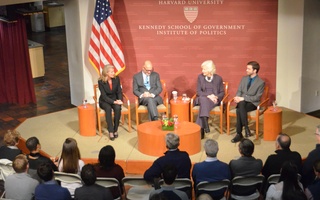With his formal installation in St. Peter’s Square on Sunday, Pope Benedict XVI took his place as the spiritual leader of the world’s 1.1 billion Catholics. His young reign, however, has already shown embryonic symptoms of a perennial papal predisposition—the urge to involve the church in the temporal affairs of sovereign states.
The first potential papal entanglement came last week when, in the first public statement of the new papacy, the Vatican condemned the Spanish parliament’s recent foray down the path towards legalizing same-sex marriage. The statement went so far as to instruct Spanish Catholic civil servants to refuse to marry homosexual couples, even at the expense of their jobs.
Certainly, it is the place of the Vatican to make its views known on important moral issues like same-sex marriage. It is not, however, the Vatican’s role to try to exercise religious influence on the affairs of secular states.
Marriage, historically, straddles the boundary between politics and religion. It is by nature a religious institution sanctioned and administered by a secular political framework. With the passage of time, however, marriage has evolved to live a double life. On the one hand, it is a religious affair, with different churches conducting marriage ceremonies in places of worship conducted by ordained clergy. On the other hand, however, it is a civic institution, with states registering marriages in secular ceremonies held in courthouses presided over by civic officials. The Vatican has always exercised spiritual sovereignty over the religious institution of marriage within the Catholic faith. With its pronouncement against Spain’s parliament, however, the Church involved itself in the ongoing political debate over the civic institution of marriage, where it has no place.
Just as marriage itself comes in religious and civic varieties, so too should the debate over same-sex marriage. Last week’s papal pronouncement is a problem because it attempts to fuse these two separate debates, by combining the issue of civil same-sex marriage into the parallel religious debate. Religious denominations around the world have struggled with the question of same-sex marriage—the Anglican Church in Canada has nearly split over the issue—and just as it is not the state’s place to interfere with these religions’ decisions to recognize (or not to recognize) same-sex marriage, it is not religion’s place to interfere with states’ decisions on the same question.
A doctrinal conservative, Benedict XVI’s opposition to same-sex marriage was well known well before his election as pope. His views on the question need not be an issue for non-Catholics, however, because whether or not the Catholic Church chooses to recognize same-sex marriage is an issue for the church alone. The parallel debate on civil same-sex marriage is, however, an issue for everyone. The Vatican is clearly perturbed by Spain’s tentative steps towards legalizing same-sex marriage. While it is its right to disagree with the Spanish government, when it comes to secular issues like this one, it is the Vatican’s responsibility to keep that disagreement to itself.
Adam Goldenberg ’08, a Crimson editorial editor, lives in Grays Hall.
Read more in Opinion
In Fight Against Stadium, Cablevision is One of ManyRecommended Articles
-
End Marriage DiscriminationYesterday, seven same-sex couples had their day in court. The couples had been denied marriage licenses and subsequently sued the
-
Equal Rights Under the LawRecent efforts by social conservatives to amend the Constitution to prohibit gay marriage are deplorable and discriminatory. Such an amendment
-
Unmarried and UnequalFor millions of Americans, the mention of marriage conjures imagery of an elegant ceremony in which a beautiful bride glides
-
A Match Made in CaliforniaSame-sex couples celebrated from San Diego to Sacramento on May 15, when the California Supreme Court announced its 4-3 decision
-
 Panelists Argue Conservative Case for Same-Sex Marriage
Panelists Argue Conservative Case for Same-Sex Marriage













